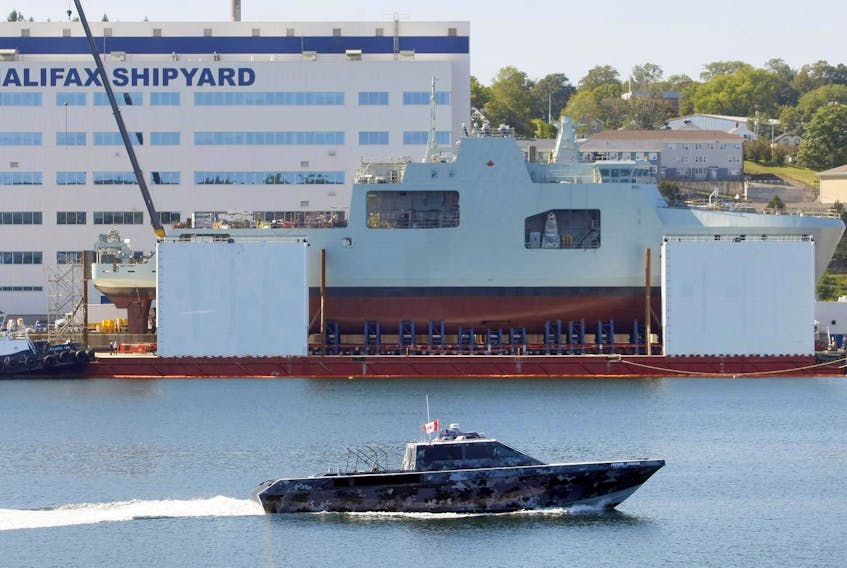Another day, and another court challenge has been filed involving Ottawa’s plans to buy $60 billion worth of new warships for the Royal Canadian Navy.
Alion Canada, the applicant in both an ongoing federal court case and a Canadian International Trade Tribunal complaint, has filed yet another challenge in federal court.
In late November, the Canadian International Trade Tribunal, an independent quasi-judicial body dealing with matters of international trade, wrote a letter to Public Services and Procurement Canada ordering the department to postpone the award of any contracts related to the Canadian Surface Combatant project while it investigated a complaint from competing bidder Alion Canada.
Then, in a letter to PSPC dated Dec. 10, the CITT rescinded its postponement order after receiving a letter from PSPC saying that the procurement is urgent and “a delay in awarding the contract would be contrary to the public interest.”
Though the CITT is is no longer asking the federal government to postpone awarding a contract, Alion’s complaint to the CITT is still active and under investigation. Alion’s most recent filing, from Dec. 31, asks the Federal Court to overturn CITT’s decision to not order a postponement.
The original federal court case, which was filed by Alion in mid-November, as well as the company’s CITT complaint centre on what Alion’s lawyers say was an erroneous decision by Public Services and Procurement Canada and Irving Shipbuilding, the prime contractor, to select Lockheed Martin Canada as the preferred bidder for the design phase of the warship project, the largest military procurement in Canadian history.
In October, a bid from Lockheed Martin Canada was identified by the federal government as the preferred design for Canada’s new fleet of warships after a lengthy and sensitive competition. The project will see 15 warships built at Irving Shipbuilding in Halifax for between $56 billion and $60 billion.
Lockheed Martin’s bid beat out offerings from two other competing consortiums: Alion, which offered up Dutch De Zeven Provinciën Class air defence and command frigate, and Navantia/SAAB’s design based on the F-105 anti-submarine frigate design for the Spanish navy.
In submissions to the CITT and federal court, Alion alleges that the BAE Systems Type 26 Global Combat Ship design offered by Lockheed is incapable of meeting three critical and mandatory requirements of the request for proposals that the firms crafted their bids around: two requirements concern the vessels’ speed, and one deals with the number of crew berths.
Alion argues that the request for proposals required PSPC and Irving to reject Lockheed’s bid because of its non-compliance. Instead, the federal government and Irving Shipbuilding announced Lockheed as the preferred bidder and has entered into the conditions precedent period. This is the step immediately prior to awarding the definition subcontract between Irving, the prime contractor and shipbuilder, and Lockheed, the warship designer.
Alion’s most recent federal court filing focuses on CITT and the federal government’s December decision to not postpone the award of that contract in the name of public interest.
In their submissions, Alion points out the CITT was essentially obligated to agree with PSPC’s directive to rescind their previous decision to delay the contract award.
Alion disagrees with PSPC’s assertion that delaying such a long-term project by just a few months would make a difference. The procurement, Alion says, has been ongoing for almost a decade, while the maximum amount of time the CITT could take to render its decision on the complaint is 135 days.
Moreover, Alion alleges that the federal government has not provided adequate reasoning to interfere with CITT’s earlier decision, violating its “duty of fairness.”
“PSPC has provided no justification for its conclusion that the procurement is urgent or the short delay herein is contrary to the public interest,” the submission reads. “No reasons, facts or materials have been provided in support of its decision. Thus, the decision-making process was anything but transparent and intelligible.”
On top of asking the federal court to overturn the CITT/PSPC decision to go ahead with the contract award despite Alion’s challenges, Alion is also asking to recoup its court fees, and for the federal government to file all documents associated with its directive to CITT.
Both PSPC and Irving have written submissions to the CITT asking the tribunal to throw out the complaint.
PSPC has opted not to comment on the proceedings while they are before the courts.









